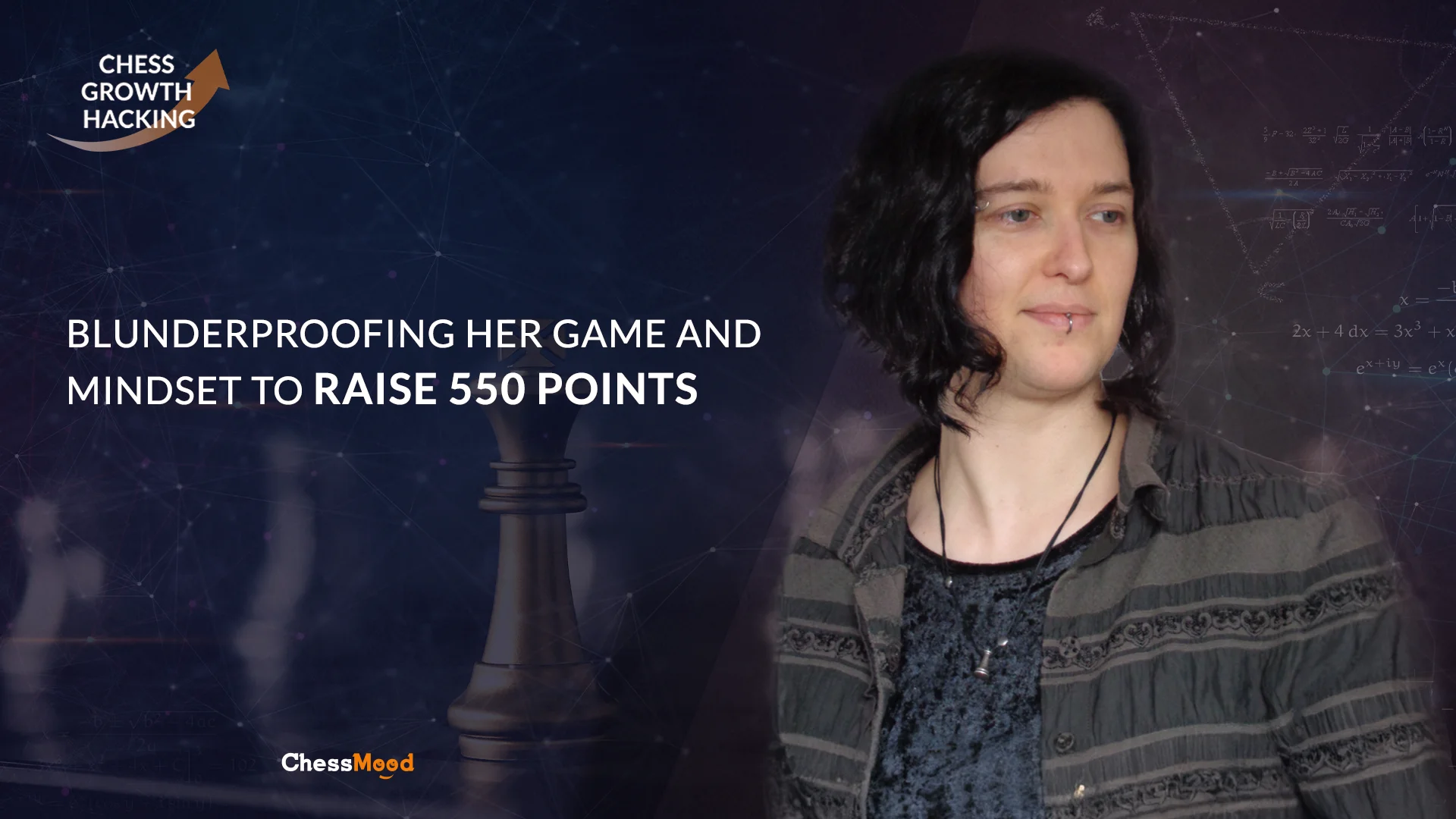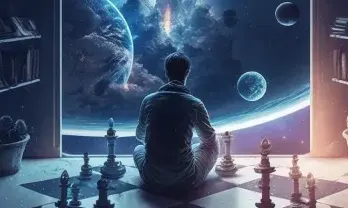Blunderproofing her Game and Mindset to raise 550 points
Every chess player knows the pain of blundering. Our student found a way to stop it from affecting her game, mood, and chess journey.
Every chess player knows the pain of blundering. Our student found a way to stop it from affecting her game, mood, and chess journey.

“Around April 2023, I got into chess because I was bored and wanted a hobby.”
“I soon became passionate about the game and started playing daily,” says Jessica Metaneira, a data entry operator living in Ireland.
But soon, she faced an issue that troubles almost every player.
“I used to blunder a lot, which annoyed me, and caused me to blunder more and tilt (a losing streak).”
“Also, excessive perfectionism was a big weakness. Focusing too much on rating and winning really stressed me out.”
On one side, she loved playing chess games.
But blunders would creep in, steal her rating and destroy her mood.
“One day, after being frustrated with hanging my Queen, I heard about GM Avetik Grigoryan's course on reducing blunders, and this was my biggest problem as a newbie.”
“So, I joined ChessMood in May 2023. I loved the dark blue color scheme and the dreamy backgrounds of each course!”

The BlunderProof course background
“The visuals made me feel inspired and powerful – as if I’d walked into some sort of high fantasy video game universe.”
“After taking the BlunderProof course and following the advice daily, I raised my Rapid rating on chess.com in the latter half of 2023.”

Jessica’s rating graph, going from 504 to touching a high of 1083
“I followed GM Avetik’s method of keeping a blunder log and noting why I made each blunder.”
“The most common mistake was hanging my Rook by leaving the long diagonal open.
So, I became stricter, always sweeping the board vertically, horizontally, and diagonally to ensure that I didn't hang a piece.”
“Lack of attention and poor calculation also caused the blunders.
So I played only when I was alert and in good form.”
You’ll soon discover the mental hack Jessica used to decide on this :)

The BlunderProof course
Should the fear of blunders stop you from playing the game you love?
Jessica followed one of the pieces of advice from this article.
“I’ve set up two accounts. My main one, and a second for playing when I’m tired or tilted or want to experiment.”
Many players scream, shout, and break things after a blunder. Jessica, too, had such moments. However, one discovery shifted her perspective!
“I remember seeing someone as precise as Nodirbek Abdusattorov make a ridiculous Bishop move. Even Magnus Carlsen has blundered.”
“So maybe I should stop being so hard on myself.”
Even in the course, we mention nobody is immune to blunders, not even the world’s best! The only exception is if you’re a child of the chess goddess Caissa😄
But, it’s very realistic to reduce your blunders to a minimum and change how you react afterward.
“It's been a work in progress, but I've gotten to the point where I don't get too mad if I make a blunder.”

While fixing your mistakes is important, you can’t ignore study – an important ingredient of chess improvement!
If you don't learn new concepts, you'll keep thinking the same way and repeat the past errors.
“In the Tactic Ninja's Annihilation section, GM Avetik discusses the concept of the ‘upcoming defender’, where you capture a piece that will be integral a few moves later— something I’ve never heard of anywhere else. This was literally a game-changer for me!”

The famous Tactic Ninja course
"My thinking evolved from a crude beginner’s mentality of capturing any available pieces to a more strategic view focused on infrastructure and identifying weak points to destroy the opponent’s position."
“After finishing the Annihilation section, I won a bunch of online events.”
“Before playing in one of the tournaments, I was feeling tired and had a lot of trouble with tilt. But something inside told me I should play.”
“GM Avetik talks about having an alter ego. Mine is an insularis pit viper.”

The source of her alter ego | Photo: hongkongsnakeid.com
"I listen to the Blue Viper's advice on when to play; she knows best"
"So I played without worrying about the result. I focused on enjoying the geometry of the positions and the mental journey of attacking my opponent’s King, and I won the U1300 arena event on lichess!"
"After winning, I contacted Lily from Student Happiness. She gave me Avetik’s favorite cake flavor and the ChessMood office address!"

Thank you for the strawberry cake and your heart-touching note, Jessica!
“The most valuable lesson I learned from ChessMood was to play because it’s worth doing. I shifted over from being obsessed with rating to appreciating the journey.”
If you could switch lives with one chess player (current or past), who would that be and why?
Judit Polgar.
I admire her psychological toughness. She bulldozes through a lot of sexism.
Your Right Mood ritual.
I have some favorite pieces of music, either heavy metal or opera.
Could you share who supported you on this journey? Did you make any new friends at ChessMood?
“My friend Suzy Lou has been great – she helps me with analysis.”
“Theoboros from Lichess has been wonderful. So has doktormarcusdavidoff.”
“JosephChessKing from the ChessMood forum is also my sparring partner for daily games. And he definitely forces me to think properly and do my calculations!”
“And I have another regular training partner, my friend Ryan Sheffield from England.”
What’s a life lesson you’ve learned from chess?
You can't be excessively perfectionist. We're all human. Nobody is immune to making a gigantic blunder.
What’s the one habit that has helped you the most to improve your chess?
Having the right mindset is essential. Otherwise, you'll just stress yourself out. You need to play chess because you love it, not because you'll be annoyed at yourself if you lose.
The one thing you love about chess.
Annihilation tactic! They're so fun when you pull off a big irreversible one!
What’s the best advice you have ever received in chess?
GM Avetik talks about the Surrender method: Play when you can gain something from it. That's very valuable.
Also, he has a way of reintroducing you to vital parts of yourself that society sometimes forces you to suppress.
For example, the principle behind the surrender experiment seems like common sense – play when you're feeling alert and healthy. However, we often override that because of obligations, such as overtime at work.
If you were to give some advice to a beginner who’s just starting to play chess, what would it be?
The most important thing you could ever teach a new chess player is that it's normal to blunder.
It's normal to do absolutely ridiculous things because you're a beginner.
If you get mad at yourself, you're just piling up stress.
Instead, laugh about it and move on.
***
You can share your congratulatory messages with Jessica under this forum thread.
Originally published Apr 30, 2024

